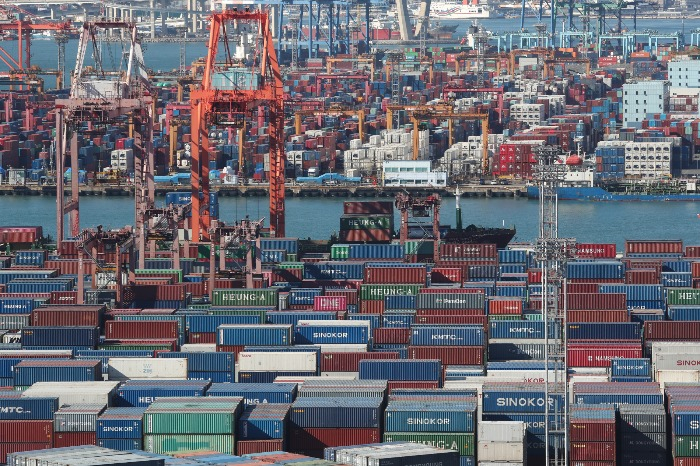Economy
S.Korea turns more upbeat about economic recovery
Asia’s No.4 economy shows signs of a gradual recovery on an improvement in the country’s factory output and chip exports
By Nov 17, 2023 (Gmt+09:00)
2
Min read
Most Read
LG Chem to sell water filter business to Glenwood PE for $692 million


Kyobo Life poised to buy Japan’s SBI Group-owned savings bank


KT&G eyes overseas M&A after rejecting activist fund's offer


StockX in merger talks with Naver’s online reseller Kream


Mirae Asset to be named Korea Post’s core real estate fund operator



South Korea is more hopeful about a gradual recovery in the economy, driven largely by revived global demand for its mainstay export semiconductors, despite lingering economic uncertainties from global geopolitical risks.
“We’ve seen signs of a gradual economic recovery driven by a rebound in factory output and chip exports, on top of the continued improvement in the service sector and employment,” Korea’s Ministry of Economy and Finance noted in a monthly economic assessment report on Friday.
This reflects a more positive tone from the Korean government after it said last month that the country’s economic slowdown had moderated.
“We are not 100% assured about the recovery, but we see a few more positive aspects about the economy this month than last month,” Lee Seung-han, the director of the ministry's economic analysis division, explained during a briefing the same day.
The country's factory output increased 3.0% in September from a year ago and 1.8% from the previous month, while its payroll added 3,460,000 new jobs in October from a year ago, according to government data.
REVIVED CHIP DEMAND
The government cited the revived global chip demand as a key reason for a recovery in the country’s exports, the main driver of Korea’s economic growth.
In the first 10 days of November, the country’s semiconductor exports increased for the first time in 13 months, raising the prospect that overseas sales of its microchips would snap a 13-month downward spiral this month.
Korea’s overall exports turned around for the first time in 13 months in October but chip shipments continued to fall, albeit at a slower pace.

“The spot prices of semiconductors have been steadily rising,” brightening the global chip demand outlook, said Lee.
He added that overseas demand for Korean cars remained solid, boding well for the country’s overall exports.
China’s economy has also fared better than expected since August, easing default concerns in the country’s real estate market, which is additional good news for the Korean economy.
Beijing is Seoul’s top trade partner.
Expectations are also growing that the US Federal Reserve would soon stop its historic rate hike campaign after inflation in the world’s No. 1 economy slowed in October.
“It is too soon to expect a pivot in the Fed’s rate decision, as the US is more likely to maintain high interest rates over the long term,” said Lee, adding that the market sees little room for the Fed’s aggressive tightening move.
But uncertainty lingers over global geopolitical risk stemming from the Russia-Ukraine and Israel-Hamas wars, increasing volatility in the global commodity market.
Korea’s economy in the third quarter grew 0.6% from the previous quarter, extending the growth streak to a third consecutive quarter on a recovery in exports.
The Bank of Korea projects the country’s economy to grow by 1.4% this year, but in August it cut its growth forecast for 2024 to 2.2% from the previous 2.3%.
Write to Se-Min Huh at semin@hankyung.com
Sookyung Seo edited this article.
More to Read
-
 EconomyKDI cuts Korea growth forecasts, ups inflation predictions
EconomyKDI cuts Korea growth forecasts, ups inflation predictionsNov 09, 2023 (Gmt+09:00)
2 Min read -
 EconomyS.Korea’s Q3 GDP up 0.6% on-quarter on recovery in exports
EconomyS.Korea’s Q3 GDP up 0.6% on-quarter on recovery in exportsOct 26, 2023 (Gmt+09:00)
3 Min read -
 EconomyKorea expects inflation to ease from Oct after 5-month high
EconomyKorea expects inflation to ease from Oct after 5-month highOct 05, 2023 (Gmt+09:00)
2 Min read -
 Central bankBOK chief’s top mission: Soft landing for household debt
Central bankBOK chief’s top mission: Soft landing for household debtAug 24, 2023 (Gmt+09:00)
2 Min read -

Comment 0
LOG IN


